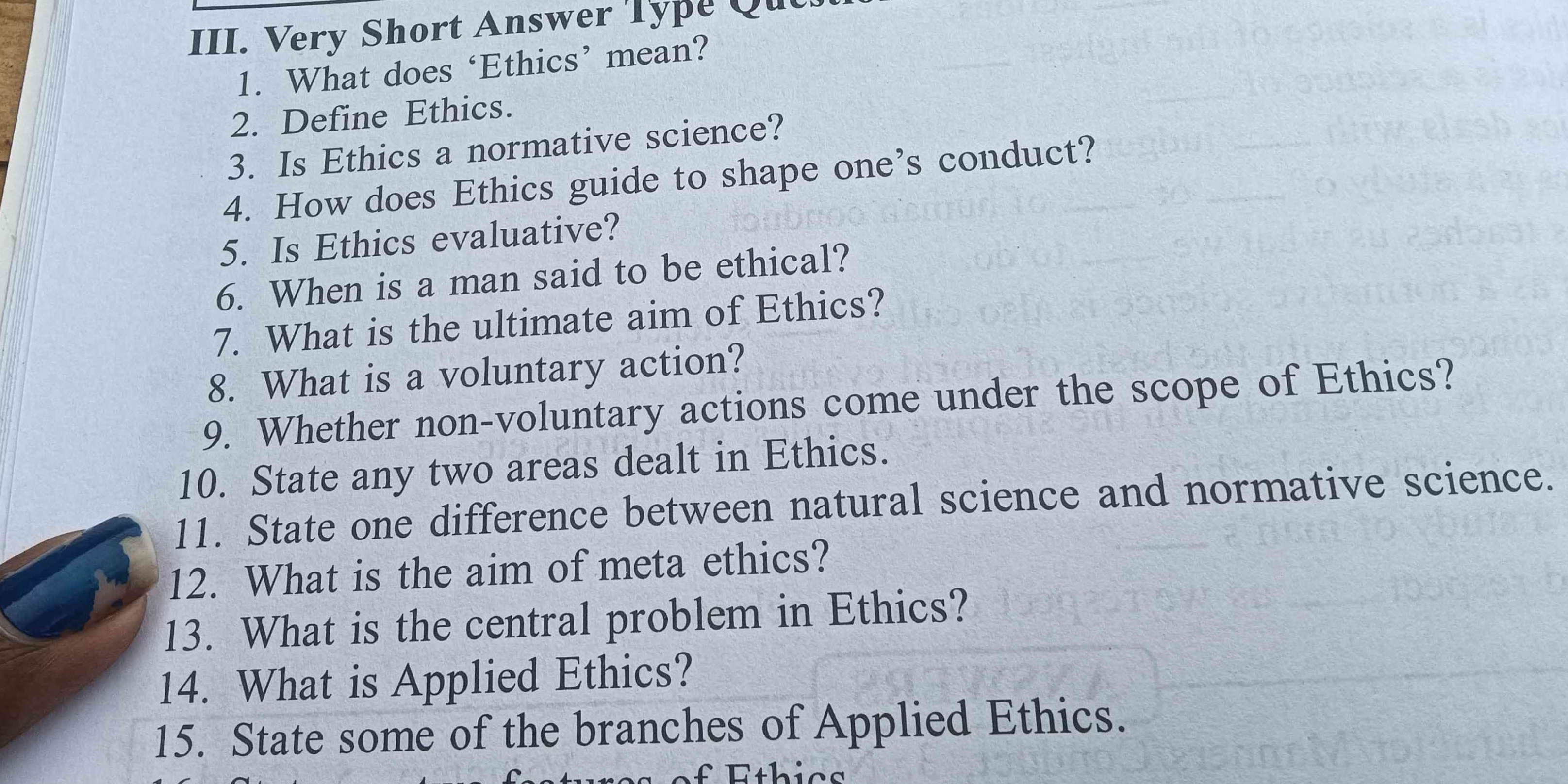What does 'Ethics' mean? Define Ethics. Is Ethics a normative science? How does Ethics guide to shape one's conduct? Is Ethics evaluative? When is a man said to be ethical? What is... What does 'Ethics' mean? Define Ethics. Is Ethics a normative science? How does Ethics guide to shape one's conduct? Is Ethics evaluative? When is a man said to be ethical? What is the ultimate aim of Ethics? What is a voluntary action? Whether non-voluntary actions come under the scope of Ethics? State any two areas dealt in Ethics. State one difference between natural science and normative science. What is the aim of meta ethics? What is the central problem in Ethics? What is Applied Ethics? State some of the branches of Applied Ethics.

Understand the Problem
The question is asking for concise definitions and explanations related to the concept of Ethics, covering its definitions, scopes, and distinctions from other fields of study.
Answer
Ethics studies moral principles for right conduct, is evaluative, a normative science, and includes subfields like meta-ethics and applied ethics.
- Ethics means the study of moral principles that define what is good/bad and right/wrong. 2. Ethics is a normative science dealing with moral ideals. 4. It guides actions by setting standards for behavior. 5. Yes, ethics is evaluative. 6. A man is ethical when he acts in accordance with moral principles. 7. The aim is to determine what is right and encourage right actions. 8. Voluntary actions are choices made with awareness and intention. 9. Non-voluntary actions are generally outside its scope. 10. Two areas: Meta-ethics and Normative ethics. 11. Normative sciences deal with norms, while natural sciences deal with facts. 12. Meta-ethics explores the nature of moral judgments. 13. The central problem is defining moral values. 14. Applied Ethics applies ethical theory to practical issues. 15. Branches: Medical Ethics, Environmental Ethics.
Answer for screen readers
- Ethics means the study of moral principles that define what is good/bad and right/wrong. 2. Ethics is a normative science dealing with moral ideals. 4. It guides actions by setting standards for behavior. 5. Yes, ethics is evaluative. 6. A man is ethical when he acts in accordance with moral principles. 7. The aim is to determine what is right and encourage right actions. 8. Voluntary actions are choices made with awareness and intention. 9. Non-voluntary actions are generally outside its scope. 10. Two areas: Meta-ethics and Normative ethics. 11. Normative sciences deal with norms, while natural sciences deal with facts. 12. Meta-ethics explores the nature of moral judgments. 13. The central problem is defining moral values. 14. Applied Ethics applies ethical theory to practical issues. 15. Branches: Medical Ethics, Environmental Ethics.
More Information
Ethics is not only about defining right and wrong but also involves applying these principles to real-world scenarios through branches like applied ethics, which tackles specific issues such as bioethics and business ethics.
Tips
Common mistakes include confusing voluntary actions with spontaneous ones or ignoring the evaluative nature of ethics that assesses actions based on standards.
Sources
- Meaning, Nature and Scope of Ethics - Distance Education - distanceeducationju.in
- Encyclopedia: Ethics - encyclopedia.com
- Ethics - Markkula Center for Applied Ethics - scu.edu
AI-generated content may contain errors. Please verify critical information